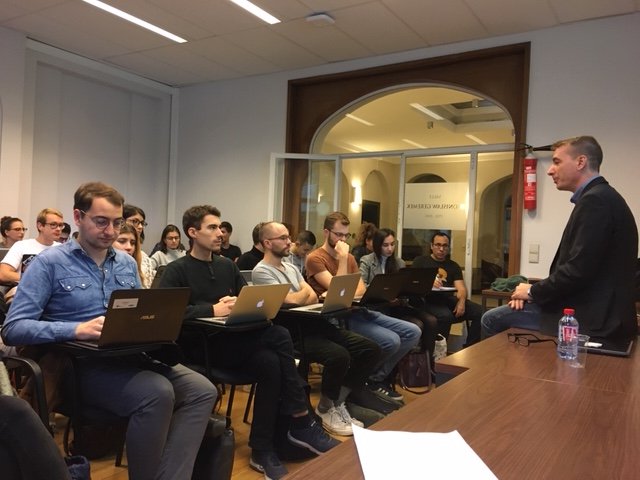 Amélie Tagu is in her second year of the Master in European Studies, a programme managed by the Faculty of Philosophy and Social Sciences with the IEE-ULB label.
Amélie Tagu is in her second year of the Master in European Studies, a programme managed by the Faculty of Philosophy and Social Sciences with the IEE-ULB label.
Benedek Jávor is a former Green MEP and member of the Hungarian Ecologist Party. During the 2014-2019 mandate, he worked on multiple issues related to climate and environment, media freedom, the rule of law, fight against corruption and transparency.
On October 24th, Benedek Jávor gave a lecture at the IEE-ULB dealing with the Rule of law, fundamental rights and democracy in Hungary, in the framework of the Jean Monnet Module Rule of law and mutual trust in global and European governance coordinated by Prof. Ramona Coman 1. An opportunity to have his opinion on the current political situation in Hungary, especially since the opposition won municipal elections in Budapest and in many other cities.
Read the highlights of the activities of the Jean Monnet Module on Rule of Law in 2018-2019
Hungary has made the headlines over the last decade following the decision of Prime minister Viktor Orbán to revise the constitution, to limit the independence of the judiciary and to change the rules of the democratic game. What is your view on the current situation in the country?
Benedek Jávor: Hungary is the leading example of how the rule of law can decline or can be destroyed in a member state. Hungary is the case study for rule of law. For me, of course, this is sad. I would be much happier to speak about how my country contributes to the transformations of Europe in a positive way, but it’s not the case. In that situation, I think that I have the responsibility to inform people about what’s really going on in Hungary. Through the Hungarian case, we can understand the shortcomings in the EU, and that’s the important thing.
“This is clearly a European problem, defining what kind of Europe we would like to build in the future”
In 2011, the Fidesz party voted a new Hungarian constitution, the Fundamental Law. As an ecologist politician you highly contested this law. Why is the Fundamental law problematic for you?
Benedek Jávor: First of all, because of the procedure followed for making the Constitution. I believe it was a forced one-party procedure, which excluded big parts of society from contributing and to consenting with the new constitution. To me, a Constitution is the basis of the organization of a political community, and it should represent common values. If the constitution doesn’t represent values and goals which are widely accepted and supported by most of the population, but is much more a political confession of one side, then it destroys the political community of the country and the society. The procedure itself was unacceptable for me.
On the other hand, I think it is against democratic considerations. This constitution was designed in a way to speed up the decline of rule of law and democratic performance of Hungary. It reformed the balance of powers in the country; it undermined the functioning of the checks and balances in a democratic system 2 .
The values represented by the new constitution are also unacceptable for me. It is a very patriarchal text. The rights of minority groups, such as women or LGBTQ communities, are out. It says that family is based on a man and a woman, but in Hungary there are thousands of people belonging to LGBTQ communities. You cannot base a political community on a text which does not respect the rights of all the people.
When the law was adopted, you were member of the Hungarian Parliament. Did you feel that an opposition was possible during the vote?
Benedek Jávor: At that time, the Fidesz party had a clear 2/3 majority and mathematically it was enough to adopt the constitution. From this perspective, the opposition didn’t really have too much options to stop it. Of course, we tried different things. We tried to alert the international and European communities to step in. This didn’t really happen, so there was no strong opposition on the international level to this process.
As a last resort, we tried to convince Fidesz to delete at least the most problematic parts of the constitution and to include some important elements for us. Even though perhaps we would have voted against the constitution, at least it could have been said that this is a common product of the political community. This proposal was totally rejected by Fidesz. Then, most the opposition decided that we are not ready to participate and to behave like this would be a normal constitution making process, so we just left.
“You cannot base a political community on a text which does not respect the rights of all the people”
During the procedure, the Hungarian government sent questions about this Fundamental law to all citizens. In a way, it took into account people’s opinions. What do you think?
Benedek Jávor: The Hungarian government, from time to time, uses these tools of public consultation, which are basically just good examples how to cheat with public participation. The questions were always very biased and one-sided. There was no option for really giving different kind of answers.
All the public consultations are designed to get publicly enforcement of the government’s position, but not really to have a mutual discussion with the society. That was the case with the constitution as well.
In September 2018, the European Parliament (EP) triggered Article 7 against Hungary, following the report written by the former Member of the EP, Judith Sargentini, also from the Greens. At that time, you were MEP. What do you think about this procedure and the way it was handled?
Benedek Jávor: I think that it was a very difficult exercise and very well carried by the rapporteur Judith Sargentini, because the European Parliament and the Green group had already experienced the Tavares report of 2013, were it was very much politicized. The statements of the Tavares report were systematically questioned and challenged by the conservative political groups in the EP.
Judith Sargentini, I think in a very smart way, decided to use already adopted reports of international organizations and bodies, just to refer them (from the European Court of Human Rights, the Venice Commission, the GRECO of the Council of Europe…). It was a very good way to avoid the criticism that the statements are biased or one-sided. She also concentrated very much to put on board the EPP.
We tried to avoid presenting a report which is voted by just certain political groups, but to have conservative MEPs or groups on board as well. At the end of the day it paid off, as more than half of EPP MEPs voted for the report. In this way, it also had a backing when the report and the core for the Article 7 procedure was sent to the Council. In spite of that, the Council does not move ahead or just recently with the Finnish presidency. And still we see some resistance from governments belonging to EPP to block the procedure.
“The political climate is changing in Europe”
How do you perceive the political future of Hungary and of the Constitutional Law?
Benedek Jávor: I believe that the political climate is changing in Europe. Perhaps, the wave which helped Viktor Orbán to stabilize and strengthen his power is over. And he’s finding himself in the international European context in a more and more difficult situation.
Domestically in Hungary, the opposition parties, after nine years, have learned the lesson. The municipal elections, last October 13, are a clear evidence that an opposition which is able to cooperate has a strong backing in the Hungarian society, and is able to have major gains in an election situation, keeping in mind that the Hungarian elections are not fair, and that the access to media is very different for the government than the opposition 3. I hope that the development in the next few years will lead us in 2022 and we will have the next national elections to a situation when we can make an off to this regime and this government.
Regarding the Fundamental Law, it was adopted by a majority constituting just a part of the country. I believe that we need to turn back to a democratic community, where the rights of each and every Hungarian citizen regardless the political believes and considerations are respected. A new Constitution should mirror the values where the Hungarian society has a consensus, in order to organize a new political community based on mutual respect and cooperation.
Why was it important for you to give this lecture at the IEE-ULB, about the rule of law and democracy in Hungary?
Benedek Jávor: I have two reasons for that, a personal and a much more political one. The personal one is that I was a university teacher for sixteen years, and I love teaching. I was happy to have the opportunity to come back a little bit to academic sector and to speak with students.
For the political consideration, I think that this rule of law problem is one of the fundamental problems in Europe nowadays. I believe that the problem of rule of law in Europe is not simply a Hungarian or a Polish concern. This is clearly Europe’s problem, defining what kind of Europe we would like to build in the future. In order to create a successful Europe, which is a community based on fundamental rights and values, we need a deep and comprehensive understanding of the problems we are having. And I think that it’s important to have the discourse towards the rule of law question in every possible place.
Missed for 6 years, now teaching again! Giving a lecture on #RuleOfLaw in the #EU with #Hungary as a case study at the #ULB Institute for European Studies. Thanks to @RamonaComan1 and all the students! pic.twitter.com/3J0iPSFCeb
— Benedek Jávor (@javorbenedek) October 25, 2019
Interview conducted in the framework of the course TRAN 0 610 Rule of Law and Mutual Trust in Global and European Governance (prof. R. Coman and A. Weyembergh)
1. [599377-EPP-1-2018-1-BE-EPPJMO-MODULE]↩
2. [the Fundamental Law has consistently reduced the competences of the constitutional court, ed 2]↩.
3. [Ecologist and left candidate, Gergely Karacsony, was elected as the new mayor or Budapest, e]↩




